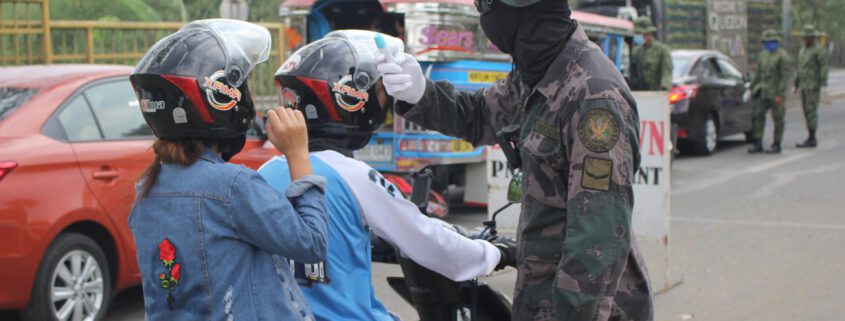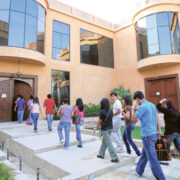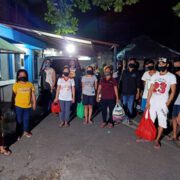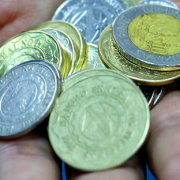Duterte govt can end lockdown sooner and help every Filipino in need
by IBON Media
The Duterte administration can end the lockdown sooner and help every Filipino in need. It can raise the resources needed for this if it lets go of its infrastructure fantasies, prioritizes life over debt, and is bolder in tapping the accumulated wealth of elites and large corporations. Not doing any of these means making the people bear the disproportionate burden of dealing with the pandemic.
Funds are available
In their most recent taped address last Thursday, April 24, the president and other members of the Inter-Agency Task Force (IATF) on Emerging Infectious Diseases took turns lamenting how little funds there are for responding to the COVID-19 crisis. No one doubts that huge resources are needed. However, using this an as excuse for failing to implement the necessary public health measures against the pandemic and for failing to help millions of poor Filipino families not just during the lockdown but amid the country’s worst economic crisis in decades is completely unacceptable.
Pres. Rodrigo Duterte declared: “Our country comes first.” For this to mean anything, the Duterte administration needs to take bolder measures to raise funds for dealing with the pandemic including letting go of its sacred cows.
Realigning the national government budget away from items that have fallen in priority is a start. However, the finance secretary’s latest declaration that the administration is preserving funds for its Build, Build, Build (BBB) program is particularly out-of-date. These BBB projects were conceptualized and justified at a time of giddy optimism about the economy. The pandemic, global recession, and domestic economic collapse mean that many projects in the Php989 billion public infrastructure program for 2020 are no longer viable and of much less priority than urgent health measures, emergency relief, and social protection.
The finance department’s earlier position that debt servicing will continue unhindered is also out-of-date. The national government is paying Php1.03 trillion to service debt in 2020 – Php451 billion for interest payments and Php582.1 billion for principal amortization. The current crisis however means that millions of Filipino families are at risk not just from the coronavirus but from disrupted livelihoods and loss of incomes. COVID-19 response spending should be prioritized over debt payments, starting with at least moratoriums on US$5.2 billion in debt service to so-called development agencies and supposedly friendly governments. The government’s human rights obligations to its people far outweigh debt service obligations.
The president said that the government will do everything necessary to raise money to fight COVID-19. This should include tapping the huge concentration of wealth and income in the country’s richest families and largest corporations. The 50 richest Filipinos had a combined wealth of Php4,061 billion in 2019, according to Forbes. The 50 largest conglomerates meanwhile had combined profits of Php856.4 billion in 2018 alone.
Much of this wealth and income is more socially useful today spent on COVID-19 response rather than accumulated as personal wealth or used for self-interested business purposes. The Duterte administration can take the bold step of issuing COVID-19 emergency bonds on solidarity terms targeted at these elites. There is also the daring step of reforming the tax system to become progressive with higher personal income and wealth taxes on the richest Filipinos and higher corporate income taxes on the largest corporations. The Duterte administration cannot say it has no money if it is not doing anything to mobilize concentrated income and wealth for socially urgent purposes.

Lockdown can be ended
Millions of Filipinos are looking forward to the end of the lockdown, especially the vulnerable majority who have gone hungry and desperate over weeks of sparse or non-existent emergency relief from the Duterte administration. However, despite Malacanang’s posturing and government agencies’ reports, the fact remains that the national government is still being slow in putting the necessary health measures in place for the lockdown to be lifted safely.
The government needs to accelerate the pace of health measures for battling the coronavirus. At the same time, it needs to immediately arrest the enormous backlog in socioeconomic relief and assistance for millions of poor and vulnerable households affected by the lockdown.
The coronavirus continues to take its toll. As of April 23, the total number of reported cases has reached 6,981, with 462 fatalities. These include 1,062 infected health care workers with 26 fatalities.
Health experts such as from the UP COVID-19 Pandemic Response Team point out that the epicenter of the virus is the National Capital Region (NCR) and surrounding regions but also that it continues to spread elsewhere and still needs to be contained. The Department of Health (DOH) concedes that it is too early to say if the curve of COVID-19 transmission has begun to flatten.
While experts attest to the contribution of the enhanced community quarantine (ECQ) in controlling the spread of the coronavirus, it has heavily impacted on the poorest sections of the population, especially in Luzon, and the economy as a whole. The ECQ is disrupting 73% of the economy, corresponding to Luzon’s share in the gross domestic product (GDP) in 2019. IBON estimates that 14.5 million workers and informal earners have been dislocated. The 7.5 million lowest-income families in Luzon are most in danger of deeper poverty and hunger since they have little savings or means to absorb the shock of disrupted livelihoods.
The lockdown need not have been expanded or dragged on for so long had the government been more efficient and immediately started putting the necessary health measures in place. Yet three months since the first case of COVID-19 and almost six weeks into the lockdown, the government is still ill-equipped to contain the pandemic.
Despite the arrival of donations and test kits, only 55,465 individuals have been tested as of April 22. This is too few, according to health advocates, compared to the potential community and hospital transmission of the virus. There are still only 17 COVID-19 testing centers out of 78 that the DOH plans to install nationwide. Only 7,000 have been contact-traced, which is low compared to the number of confirmed COVID-19 cases.
Quarantine, isolation, and treatment facilities remain insufficient: the health system is not yet ready for when infections and hospitalizations peak in the coming months. Frontline health workers still lack protective equipment. This has already resulted in the Philippines having among the worst infection rate and highest number of COVID-19-infected health workers in the world.

Unnecessary suffering
At the same time, the government is failing to ensure that all poor and vulnerable families affected by the lockdown get adequate emergency relief. Their rights to food, health, water and sanitation, and social protection are grossly unmet and even violated.
Over 13 million of government’s targeted 18 million low income families have not received emergency subsidies and are going hungry. Only 264,154 formal workers out of the IBON-estimated 10.7 million workers in the country have reportedly received assistance, and just 235,949 informal earners out of 5.2 million nationwide. Only 353,037 of 9.7 million farmers, farmworkers, and fisherfolk are reported to have received emergency subsidies.
The government claims to have released Php205 billion for emergency assistance. However, it is unconscionable for the government to have created so many bureaucratic barriers before this much-needed aid reaches the poor. These should be immediately removed.
The ECQ will be extended until May 15 in selected high-risk areas including the NCR, Calabarzon, Central Luzon, Benguet, Pangasinan, Albay, Catanduanes, Mindoro Island, Antique, Ilo-ilo Cebu, Davao Del Norte, and Davao City. Other parts of the country considered “low-risk” or “moderate-risk”, meanwhile, have been put under a “general community quarantine”, where aside from ECQ measures, “non-leisure stores” can partially open, higher education can finish the academic year, some construction projects may resume, and public transportation may operate on reduced capacity.
Affected families need expedient emergency relief in the period to come on top of what is due them for the past six weeks.
Making the most-affected families wait a day longer for aid that should have started coming many weeks ago nullifies government’s facade of being resource-capable with supposedly Php1.49 trillion towards its 4-pillar socioeconomic strategy against COVID-19. This amount gives the impression of huge spending but is really bloated by items that should not be counted as a ‘budget’ for the response.
In truth, the government plans to spend just Php366.9 billion with another Php133.7 billion for loan programs and credit guarantees. There is just Php50.7 billion for health response – it remains to be seen if this is enough to address the worst public health crisis in the country’s history.
The balance of Php316.2 billion is for social assistance. Yet this barely covers the Php297.1 billion in emergency socioeconomic relief that IBON estimates is needed for every month of the lockdown, which should include: emergency relief packages for the poorest 5 million families (Php15 billion); unconditional cash transfers for the poorest 10 million families (Php100 billion); wage subsidies for 10.7 million workers in formal establishments (Php53.5 billion); financial assistance for 5.2 million informal workers (Php26 billion) and 9.7 million farmers and fisherfolk (Php97 billion); and emergency support for 5.6 million indigent seniors and pensioners (Php5.6 billion).
Protecting people’s lives is the paramount concern, and the government should do everything necessary for this. This includes ensuring that the millions of families do not go hungry or suffer. It also includes giving special attention to high risk groups aside from the poor, such as the sick, elderly and those in congested jails. It however does not mean setting aside human rights as the Duterte government’s militarized approach is doing.
The lockdown may help contain the spread of the virus but this is at great social and economic cost and will be more and more untenable the longer it drags on. The necessary health measures have to be secured for the lockdown not be put to waste. At the same time, the government must ensure that it is giving enough attention to mitigating the lockdown’s effect especially on the poorest Filipinos. The country must deal with the pandemic, and the Duterte administration has the responsibility and obligation to ensure that this is done humanely and compassionately. The government also cannot claim that it does not have the money to respond well if it is just being blind to what really needs to be done. #
= = = =
Kodao publishes IBON articles as part of a content-sharing agreement.







